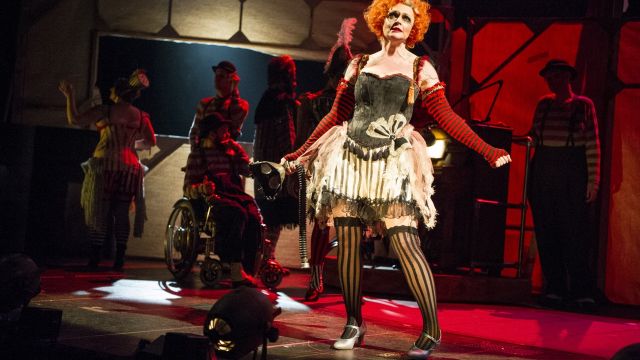The Threepenny Opera
Watching a rather solemn rehearsal of The Threepenny Opera in the United States, in the 1950s, Bertolt Brecht voiced a loud objection: ‘Das ist nicht spass!’ (This is no fun!’) However serious, or indeed didactic, the show, it still better to be fun. That is, sharp, funny and entertaining – plus ravishing the audience with insights about their world.
This National Theatre production by Rufus Norris is certainly fun. It has a relentless drive and energy and a cheerful, leering cynicism that has you grinning at its black-as-black humour. Better too – from Brecht’s point of view - if the audience is not lulled into forgetting they’re in a theatre. No chance of that either. The band of eight musicians, in costume, are in plain view on the big Olivier Theatre stage where the sets are flimsy framework and paper and stagehands in plain view move them around. Stairs to nowhere are a paint-splattered industrial steel flight on wheels. Designer Vicki Mortimer also gives us costumes that are suggestive but cartoonish – deliberate exaggerations of cliché. The performances are likewise and directed more to the audience than to the other players. This last is also as Brecht preferred: an actor comments on the character rather than being the character.

Simon Stephens’ explicit, vulgar, angry, frequently obscene adaptation of Brecht and Hauptmann’s 1928 text brings this landmark music theatre piece right into the present. Despite the blatant, in-your-face theatricality, within minutes you’re thinking, ‘This show is about now.’ Originally written and performed in the financial disaster of the Weimar Republic, the parallels are not exact, but the resonance fits. This ‘opera’ (or anti-opera) shows a Victorian London run by criminals, exploiters and corrupt cops, as an underclass seethes beneath, doing what they can to survive – and it isn’t pretty. Our ‘hero’ Macheath is a psychopathic master criminal, serial murderer and a womaniser who can’t keep his trousers buttoned. His best mate – and they were once very, very close – is police chief Tiger Brown. They were in the Army together, see? In brutal Kandahar. The city’s beggars are clothed, rehearsed and ripped off (50% of earnings) by Jonathan Peachum and his wife Celia. Things go awry when Macheath ‘marries’ the Peachums’ daughter Polly – even though he’s had Tiger Brown’s daughter Lucy before this, and Jenny Diver, now a prostitute, and – some time since – even Mrs Celia Peachum…
Rory Kinnear’s Macheath – ‘Mack the Knife’ - may not have the charisma of the ‘master criminal’ who gets away with murder – over and over – but he gives us a sleazy, glittering-eyed, lip-licking psychopath in his tight buttoned suit with huge knife in the inside pocket. A clearly pregnant Rosalie Craig is Polly Peachum, a beautifully cast contrast to the other women in Macheath’s life: a tall woman in braids and glasses, she turns out to have a head for ‘business’ and her rendering of the famous revenge fantasy song ‘Pirate Jenny’ sends shivers down your spine. Mrs Peachum (Haydn Gwynne) is a rangy, vengeful, dangerous figure. Sharon Small as the hapless, abandoned, drug-addicted Jenny Diver, done up like a ravaged cliché prostitute, milks all the pathos there is from ‘Surabaya Johnny’ - a ring-in number from Hauptmann’s Happy End. Hauptmann’s influence on her rather ruthless, shameless collaborator, Brecht, is evident in the sympathetic and complex portrayal of the female characters.

Peter de Jersey makes Tiger Brown a fellow who’d like to be straight, but in this world… But Nick Holder as Mr Peachum is unforgettable, riveting – a mix of high camp and icy calculation, his embonpoint bursting out of his respectable suit, set off by his darling high heel shoes with dinky bows.
But as Claire Allfree said of the production in the London ‘Telegraph’, Kurt Weill’s music has the emotion that Brecht tries to keep out. The score, a mix of jazz and 1920s German dancehall music, is jaunty but dark, disturbing in the way it avowedly supports but contrasts with the bleak or cynical or furious lyrics – not all by Brecht, by the way. But everyone knows ‘Mack the Knife’, recorded by Louis Armstrong, Frank Sinatra, Bobby Darin and a host of others. Nina Simone recorded an unforgettable version of ‘Pirate Jenny’, but there are many songs here that, once heard, stay with you – as they stayed with Rufus Norris from the age of sixteen when he played Macheath in a school production. ‘The Barbara Song.’ ‘The Cannon Song’ (with a nod to Rudyard Kipling). The ‘Tango Ballad.’ ‘What Keeps Mankind Alive?’ ‘A Man Lives by His Head (His Head Will Not Suffice). ’. (What a contrast to so much contemporary ‘music theatre’ with their instantly forgettable scores.)
All that said, perhaps there’s just a little too much fun. The light touch, as we get to Act III, starts to feel a bit one note and – at the risk of offending Brecht devotees and purists – the show in the end feels too long or overstated. I found myself thinking – albeit with some regret – as once again we’re told how it’s impossible to be ‘good’ in this world, ‘Bertolt, we’ve got the point!’ Nevertheless, this Threepenny Opera is a fabulous achievement: Mr Norris’ direction ensures constant invention and a cracking pace; the wonderful music and songs could not be better delivered; the design of set and costumes is witty and deliberately unreal; and the performances have you delighted and admiring. As for the politics: confrontational and offensive, of course. But fun.
Michael Brindley
Photographer: Richard Hubert Smith
Subscribe to our E-Newsletter, buy our latest print edition or find a Performing Arts book at Book Nook.

